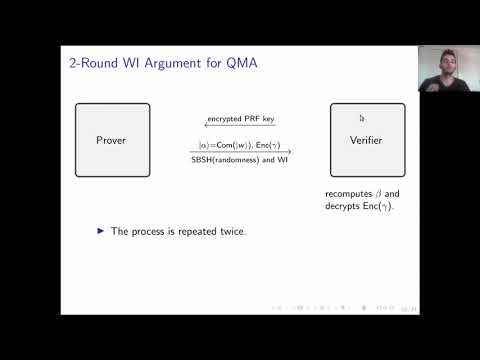CryptoDB
The Round Complexity of Quantum Zero-Knowledge
| Authors: | |
|---|---|
| Download: | |
| Presentation: | Slides |
| Abstract: | We study the round complexity of zero-knowledge for QMA (the quantum analogue of NP). Assuming the quantum quasi-polynomial hardness of the learning with errors (LWE) problem, we obtain the following results: - 2-Round statistical witness indistinguishable (WI) arguments for QMA. - 4-Round statistical zero-knowledge arguments for QMA in the plain model, additionally assuming the existence of quantum fully homomorphic encryption. This is the first protocol for constant-round statistical zero-knowledge arguments for QMA. - 2-Round computational (statistical, resp.) zero-knowledge for QMA in the timing model, additionally assuming the existence of post-quantum non-parallelizing functions (time-lock puzzles, resp.). All of these protocols match the best round complexity known for the corresponding protocols for NP with post-quantum security. Along the way, we introduce and construct the notions of sometimes-extractable oblivious transfer and sometimes-simulatable zero-knowledge, which might be of independent interest. |
Video from TCC 2021
BibTeX
@article{tcc-2021-31543,
title={The Round Complexity of Quantum Zero-Knowledge},
booktitle={Theory of Cryptography;19th International Conference},
publisher={Springer},
doi={10.1007/978-3-030-90459-3_5},
author={Orestis Chardouvelis and Giulio Malavolta},
year=2021
}

